In a remarkable display of the growing demand for vacation rentals, Miami’s short-term rental market is poised to experience a staggering 35% increase in Airbnb listings by 2024. This surge in popularity underscores the city’s allure as a premier destination for travelers seeking seamless and personalized accommodations. As the short-term rental industry continues to evolve, it’s crucial to examine the key trends shaping this dynamic sector and how it will impact both hosts and guests in the vibrant city of Miami.
Key Takeaways
- Miami’s short-term rental market is expected to see a 35% increase in Airbnb listings by 2024, reflecting the city’s growing appeal as a vacation destination.
- Trends such as the rise in domestic travel, remote work opportunities, and the demand for unique experiences are driving the growth of the short-term rental market in Miami.
- Regulatory changes, including licensure requirements and the impact of local government policies, are shaping the market and influencing the operations of short-term rental hosts.
- Pricing trends, the role of technology, and the evolving preferences of guests are crucial factors that will determine the future success of the short-term rental market in Miami.
- Sustainability, community impact, and the importance of professional property management are emerging as important considerations for the long-term viability of the short-term rental industry in the city.
Overview of Short-Term Rentals in Miami
The vibrant city of Miami has become a hub for short-term rental accommodations, offering visitors a diverse array of options beyond traditional hotels. Short-term rentals, facilitated by platforms like Airbnb and Vrbo, have become an increasingly popular choice for travelers seeking more personalized, authentic experiences during their stays.
Definition and Importance
Short-term rentals refer to the temporary leasing of private homes, apartments, or other residential properties for a period of less than 30 days. These rentals provide guests with the comforts of a home-away-from-home, often with added amenities and the chance to immerse themselves in local neighborhoods. The growth of short-term rentals has been a significant boon to Miami’s tourism industry, offering alternative accommodation options and generating additional income for property owners.
Market Size and Growth
Miami’s short-term rental market has experienced substantial expansion in recent years. According to industry data, the number of short-term rental listings in the city has more than doubled since 2018, with over 25,000 active properties listed on major vacation rental platforms. This rapid growth reflects the increasing demand from both domestic and international travelers seeking unique and flexible accommodations in the city.
Key Players in Miami
- Airbnb: One of the leading short-term rental platforms, Airbnb offers a wide range of property types, from cozy apartments to luxury villas, catering to diverse traveler preferences.
- Vrbo (Vacation Rentals by Owner): Vrbo specializes in whole-home rentals, providing guests with more spacious and private accommodations compared to traditional hotel rooms.
- Local Property Management Companies: Several Miami-based companies offer professional management services for short-term rental properties, handling tasks such as listing, pricing, and guest communication.
The growth of short-term rentals in Miami has been fueled by the city’s allure as a premier vacation destination, offering a unique blend of sun, sand, and vibrant cultural experiences. As the market continues to evolve, understanding the nuances of this dynamic industry will be crucial for both property owners and policymakers navigating the vacation rental regulations in the city.
Current Short-Term Rental Market Trends
Miami’s short-term rental market is experiencing a surge of activity, driven by several key trends that are shaping the industry. As the tourism trends and vacation rental occupancy rates continue to evolve, it’s crucial for Airbnb hosts and short-term rental providers to stay attuned to these market shifts.
Increase in Domestic Travel
One of the most notable trends is the rise in domestic travel. With international travel still facing pandemic-related uncertainties, more Americans are opting to explore domestic destinations like Miami. This influx of domestic tourists has led to a spike in demand for short-term rentals, as travelers seek out unique and local experiences. Airbnb hosts who can effectively market their properties to this growing segment of domestic travelers are poised to see a significant boost in their vacation rental occupancy rates.
Rise in Remote Work Opportunities
The COVID-19 pandemic has also accelerated the shift towards remote work, allowing more individuals to embrace a location-independent lifestyle. As a result, many remote workers are seeking out short-term rentals in desirable destinations like Miami, where they can work and play. Airbnb hosts who can cater to the needs of this remote workforce, such as providing fast and reliable internet, comfortable workspaces, and amenities that support a productive work-from-anywhere lifestyle, are likely to experience higher occupancy rates and longer stays.
Demand for Unique Experiences
Traveler preferences are also evolving, with a growing demand for unique, local experiences. Airbnb hosts who can offer distinctive properties, immersive activities, or curated neighborhood recommendations are better positioned to attract guests seeking an authentic and memorable stay. By leveraging the marketing strategies that highlight the unique aspects of their rentals, hosts can capitalize on this trend and stand out in the competitive short-term rental market.
| Trend | Impact on Short-Term Rentals | Opportunities for Hosts |
|---|---|---|
| Increase in Domestic Travel | Surge in demand for short-term rentals | Effective marketing to domestic travelers |
| Rise in Remote Work | Longer stays and increased occupancy | Offering amenities and workspaces for remote workers |
| Demand for Unique Experiences | Need for distinctive and immersive rental offerings | Highlighting unique property features and local experiences |
“The short-term rental market in Miami is evolving rapidly, and savvy Airbnb hosts who can adapt to these emerging trends will be well-positioned to thrive in the years ahead.”
Regulatory Changes Impacting the Market
As the vacation rental regulations and rental property investment landscape in Miami continues to evolve, it is crucial for both hosts and investors to stay informed about the latest regulatory changes affecting the short-term rental market. This section provides an overview of Miami’s current regulations, the licensure requirements, and the impact these changes have on property owners.
Overview of Miami's Short-Term Rental Regulations
Miami has implemented a comprehensive regulatory framework to govern the short-term rental industry. The city’s laws aim to strike a balance between supporting the vacation rental market and addressing the concerns of local residents. Key regulations include restrictions on the number of rental days, minimum stay requirements, and mandatory registration and licensing for all short-term rental properties.
Licensure Requirements for Short-Term Rental Hosts
- All rental property investment owners in Miami must obtain a valid business tax receipt and short-term rental license before listing their property on any online platform.
- The licensing process involves submitting detailed property information, proof of insurance, and paying the required fees.
- Hosts are also required to display their license number on all advertisements and rental listings.
Impact of Regulations on Short-Term Rental Hosts
The implementation of these vacation rental regulations has had a significant impact on the operations and profitability of short-term rental hosts in Miami. Compliance with the licensing requirements and restrictions has increased the administrative burden for many property owners, leading to higher operating costs and reduced revenue potential.
“The new regulations have forced us to rethink our entire short-term rental strategy. While we understand the city’s intent, the additional expenses and limitations have made it challenging to maintain the same level of profitability.”
Despite these challenges, many rental property investment owners are adapting their business models to navigate the evolving regulatory landscape and continue offering exceptional guest experiences in Miami.

Popular Neighborhoods for Short-Term Rentals
When it comes to Airbnb listings and vacation rental demand in Miami, certain neighborhoods stand out as hotspots for short-term stays. From the vibrant energy of South Beach to the artistic flair of Wynwood and the cosmopolitan vibe of Brickell, these areas offer a diverse range of experiences for travelers.
South Beach
South Beach is a perennial favorite among visitors to Miami, known for its Art Deco architecture, lively nightlife, and stunning beaches. The demand for Airbnb listings in this iconic neighborhood remains consistently high, with travelers seeking to immerse themselves in the laid-back, beachfront lifestyle. Vacation rental prices in South Beach tend to be on the higher end, reflecting the area’s popularity and desirability.
Wynwood
In recent years, Wynwood has emerged as a hub for creative expression and artistry, transforming into a mecca for Airbnb listings and vacation rental demand. This vibrant neighborhood boasts colorful murals, trendy eateries, and a thriving arts community, making it an attractive destination for those seeking a unique and authentic Miami experience. Vacation rental prices in Wynwood are often more affordable compared to other high-demand areas.
Brickell
As Miami’s financial district, Brickell has become a sought-after location for short-term rentals, particularly among business travelers and professionals. The area’s sleek high-rises, luxury amenities, and proximity to downtown attractions make it a prime destination for Airbnb listings. Vacation rental prices in Brickell tend to be on the higher side, reflecting the neighborhood’s upscale character and the demand for convenient, urban accommodations.
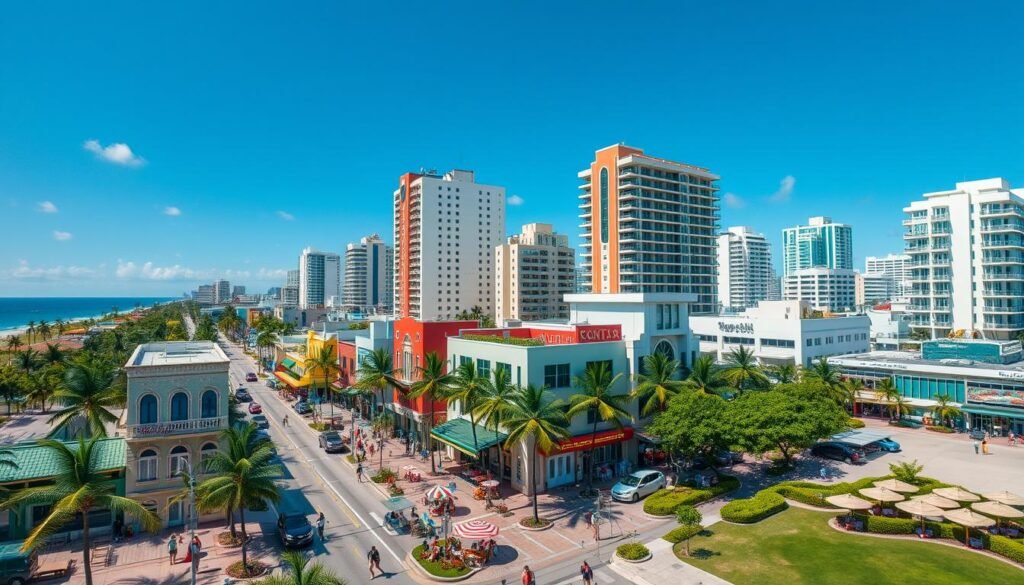
These three neighborhoods – South Beach, Wynwood, and Brickell – have emerged as the most popular areas for Airbnb listings and vacation rental demand in Miami. Each offering a distinct set of experiences, these areas cater to a wide range of travelers, from those seeking sun-drenched beaches to those drawn to the city’s vibrant arts and culture scene.
Pricing Trends for Rentals
As the short-term rental market in Miami continues to evolve, understanding pricing trends has become increasingly crucial for hosts and property owners. From analyzing average daily rates to exploring seasonal fluctuations and drawing comparisons with traditional hotel pricing, this section delves into the intricacies of vacation rental pricing strategies in the dynamic Miami market.
Average Daily Rate Analysis
The average daily rate (ADR) for short-term rentals in Miami has seen steady growth in recent years, reflecting the increasing demand for unique and convenient accommodation options. By closely monitoring ADR trends, hosts can strategically price their listings to remain competitive and maximize revenue.
Seasonal Price Variability
Miami’s Short-Term Rental Market Trends are characterized by significant seasonal price variations, with rates typically peaking during the peak tourism seasons. Savvy hosts leverage dynamic pricing tools and adjust their rates accordingly to capitalize on periods of heightened demand.
Comparison with Traditional Hotels
When examining the pricing landscape, short-term rentals in Miami often offer a more cost-effective alternative to traditional hotel accommodations. By understanding this dynamic, hosts can position their properties to attract a broader range of guests seeking value-driven experiences.
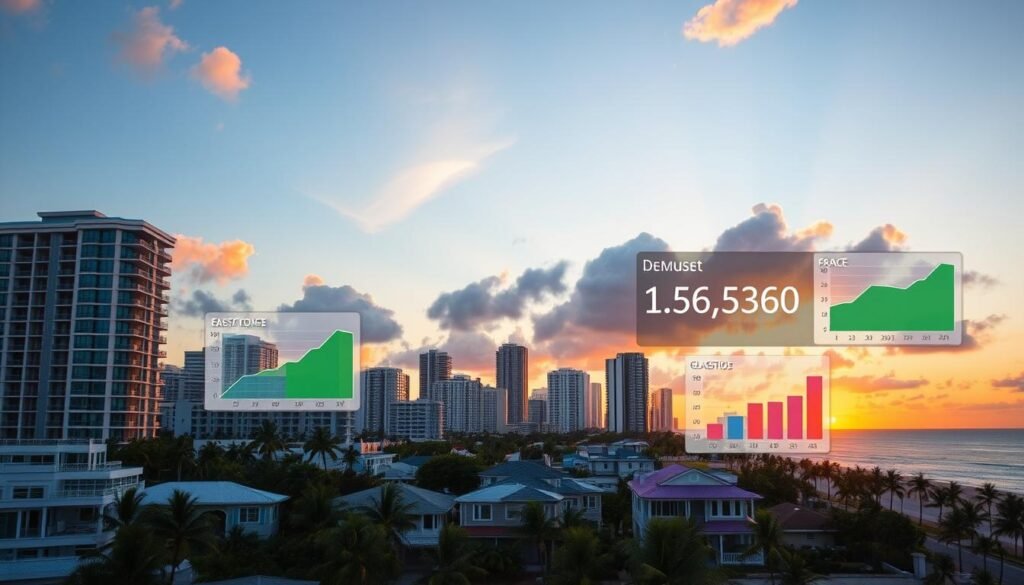
“Optimizing pricing strategies is crucial for hosts looking to stay ahead in the competitive Miami short-term rental market. By leveraging data-driven insights and adapting to seasonal fluctuations, they can ensure their properties remain appealing and profitable.”
As the short-term rental market in Miami continues to evolve, understanding and implementing effective vacation rental pricing strategies will be key to the success of hosts and property owners alike.
Technology's Role in Short-Term Rentals
The Miami short-term rental market has been significantly shaped by the rapid technological advancements in the industry. From innovative booking platforms to cutting-edge smart home features, technology has become an integral part of the vacation rental experience.
Importance of Booking Platforms
Short-term rental platforms have revolutionized the way travelers search, book, and manage their accommodations. These user-friendly short-term rental platforms have made it easier than ever for hosts to list their properties and connect with a global audience of potential guests. With features like dynamic pricing, digital payments, and streamlined communication, these platforms have become indispensable tools for vacation rental property management in Miami.
Smart Home Innovations
The rise of smart home technologies has also transformed the short-term rental experience. From keyless entry systems to automated temperature controls, these innovations have not only enhanced the convenience for guests but also improved the efficiency and security of rental properties. Savvy hosts in Miami have embraced these smart home innovations to provide a seamless and technologically advanced stay for their visitors.
Use of Data Analytics
The short-term rental industry has also witnessed the growing importance of data analytics. Hosts and vacation rental property management companies are leveraging data-driven insights to make informed decisions about pricing, marketing, and property management. By analyzing guest preferences, booking trends, and market dynamics, they can optimize their strategies and stay ahead of the competition in the dynamic Miami market.
| Feature | Benefit |
|---|---|
| Booking Platforms | Streamlined guest-host interactions, global reach, and efficient property management |
| Smart Home Innovations | Increased convenience, security, and energy efficiency for guests and hosts |
| Data Analytics | Informed decision-making, optimized pricing and marketing, and improved property performance |
As the short-term rental market in Miami continues to evolve, the role of technology will only become more prominent. Savvy hosts and vacation rental property management companies must stay informed about the latest technological advancements to stay competitive and provide an exceptional experience for their guests.
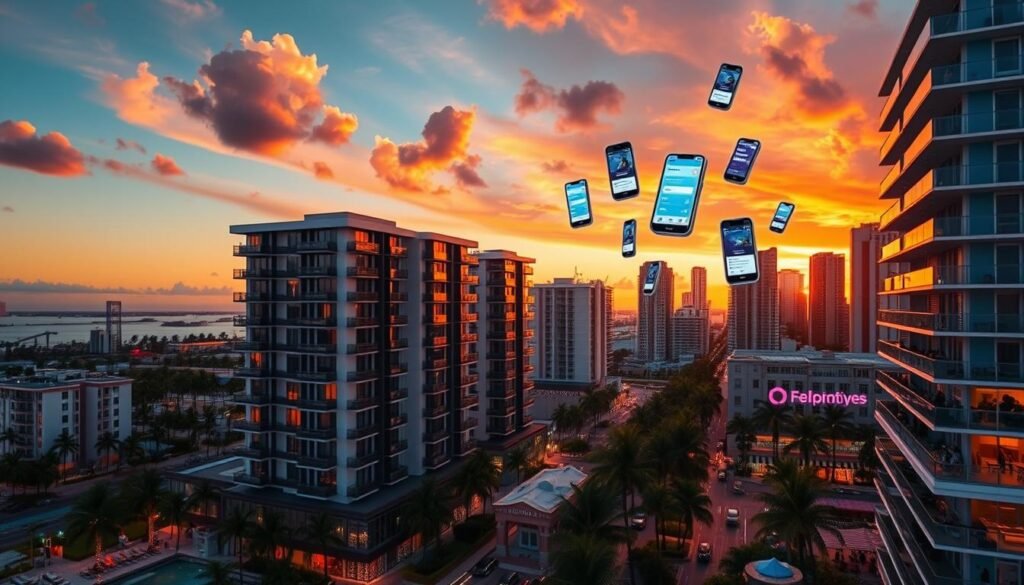
Guest Demographics and Preferences
As the tourism trends in Miami continue to evolve, the short-term rental market has witnessed a diverse array of guest demographics, each with their unique preferences and demands. From millennials and Gen Z travelers seeking immersive experiences to families in search of comfortable accommodations, and business professionals seeking convenient lodging options, the city’s vacation rental landscape caters to a wide range of guests.
Millennial and Gen Z Travelers
Younger generations, including millennials and Gen Z, have emerged as a significant driver of vacation rental demand in Miami. These tech-savvy travelers are drawn to the city’s vibrant nightlife, art districts, and cultural attractions, often seeking short-term rentals that offer a more authentic and personalized experience compared to traditional hotels. They prioritize unique amenities, local recommendations, and opportunities to immerse themselves in the city’s lively atmosphere.
Family-Oriented Stays
Families seeking a home-away-from-home environment have also become a prominent segment of Miami’s vacation rental market. These guests value spacious accommodations, kid-friendly amenities, and easy access to family-friendly activities and attractions. Short-term rentals provide families with the flexibility to prepare meals, enjoy communal living spaces, and create lasting memories during their vacation in the city.
Business Travelers
The influx of remote work opportunities and the city’s growing reputation as a hub for business and entrepreneurship have attracted a significant number of business travelers to Miami’s short-term rental market. These guests seek accommodations that offer a comfortable and productive workspace, reliable internet connectivity, and convenient access to meeting venues and corporate destinations. Vacation rentals with dedicated office spaces and professional-grade amenities have become increasingly popular among this segment.
As the tourism trends in Miami continue to evolve, the short-term rental market has proven its ability to cater to the diverse needs and preferences of its guests. From millennials and Gen Z seeking immersive experiences to families seeking a home-away-from-home, and business travelers seeking productive work environments, Miami’s vacation rental landscape continues to adapt and thrive.
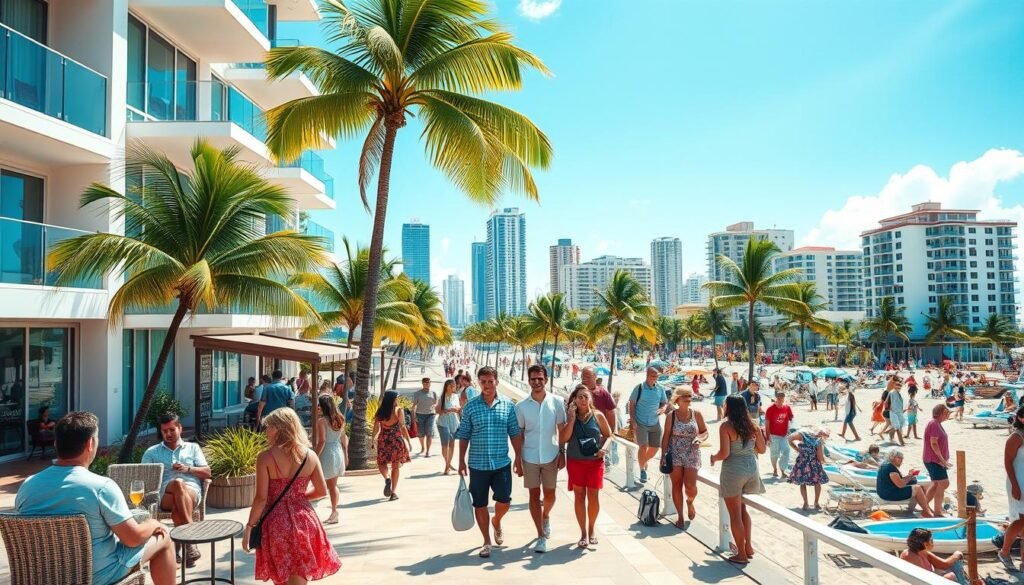
Impact of Local Events and Tourism
Miami’s vibrant tourism scene is heavily influenced by a variety of local events, festivals, and seasonal trends that shape the demand and pricing for short-term rentals throughout the year. Understanding these dynamics is crucial for vacation rental hosts to effectively manage their properties and optimize occupancy rates.
Festivals and Conferences
Miami is renowned for its diverse cultural events, from the iconic Art Basel art fair to the South Beach Wine & Food Festival. These high-profile festivals and conferences draw large crowds of tourists and event attendees, leading to spikes in vacation rental occupancy rates and increased pricing during those time periods. Hosts must be attuned to these event calendars to capitalize on the surge in demand.
Sports Events
As a major sports hub, Miami hosts a wide range of athletic events throughout the year, including Miami Open tennis tournaments, Miami Dolphins NFL games, and various college sports championships. These events attract sports enthusiasts and fans, creating additional demand for short-term rentals in the city. Vacation rental owners can benefit from understanding the event schedules and positioning their properties accordingly.
Seasonal Tourism Trends
Miami’s tourism patterns exhibit distinct seasonal variations, with peak demand typically occurring during the winter months and summer months witnessing a slight dip in occupancy rates. Savvy vacation rental hosts can leverage these trends by adjusting their pricing and marketing strategies to align with the ebb and flow of tourism trends, optimizing their overall revenue and occupancy rates.
| Event/Season | Impact on Vacation Rental Occupancy | Typical Price Range |
|---|---|---|
| Art Basel | Significant increase | $300 – $600 per night |
| South Beach Wine & Food Festival | Moderate increase | $200 – $400 per night |
| Miami Dolphins NFL Games | Moderate increase | $150 – $300 per night |
| Winter Season (December – March) | Peak demand | $200 – $500 per night |
| Summer Season (June – August) | Slight decrease | $150 – $300 per night |
By closely monitoring the impact of local events and seasonal tourism trends, vacation rental hosts in Miami can make informed decisions to maximize their occupancy rates and revenue, while providing guests with exceptional experiences tailored to their specific needs.

Safety and Cleanliness Standards
As the vacation rental property management industry in Miami continues to evolve, the importance of safety and cleanliness standards has come to the forefront, especially in the wake of the COVID-19 pandemic. Short-term rental hosts in Miami have had to adapt their practices to address the changing Short-Term Rental Market Trends in Miami and meet the heightened expectations of guests.
Post-Pandemic Adjustments
The pandemic has ushered in a new era of heightened cleanliness protocols for vacation rentals in Miami. Hosts have implemented rigorous cleaning routines, with a focus on disinfecting high-touch surfaces and using EPA-approved cleaning products. Many have also invested in technologies like UV light sanitizers and electrostatic sprayers to ensure the thorough disinfection of their properties.
Guest Expectations
Travelers today are more conscious than ever about the cleanliness and safety of their accommodations. Guests in Miami’s vacation rental market now expect a high level of hygiene, with clear policies and procedures in place to protect their health and well-being. They often research a host’s cleanliness protocols and reviews before booking, making this a critical factor in their decision-making process.
Best Practices for Hosts
- Develop and strictly adhere to a comprehensive cleaning and disinfection protocol
- Provide ample cleaning supplies and personal protective equipment for staff
- Implement contactless check-in and check-out procedures to minimize in-person interactions
- Communicate clearly with guests about the safety and cleanliness measures in place
- Regularly train staff on the latest cleaning best practices and safety guidelines
- Maintain transparency and responsiveness to guest concerns and feedback
By prioritizing safety and cleanliness, vacation rental hosts in Miami can build trust with guests, differentiate their properties, and remain competitive in the evolving Short-Term Rental Market Trends in Miami.

Sustainability in the Rental Market
In the dynamic vacation rental market of Miami, there is a growing emphasis on sustainability and eco-friendly practices. As rental property investment continues to rise, hosts and property owners are increasingly recognizing the importance of adopting sustainable solutions to meet the evolving expectations of environmentally-conscious travelers.
Eco-friendly Property Practices
From implementing energy-efficient appliances and lighting to promoting waste reduction and recycling, Airbnb hosts are exploring innovative ways to reduce the carbon footprint of their rental properties. Many are also incorporating renewable energy sources, such as solar panels, to power their homes and offer guests a more sustainable travel experience.
Guest Preferences for Sustainable Options
Conscious consumers, particularly millennials and Generation Z, are increasingly seeking out vacation rental options that prioritize sustainability. Hosts who showcase their eco-friendly initiatives and offer guests the opportunity to contribute to sustainable practices, such as composting or water conservation, are often more appealing to this growing demographic of travelers.
Local Government Initiatives
The city of Miami has also taken steps to promote sustainability in the rental property investment market. Through various policy initiatives and incentive programs, local authorities are encouraging property owners to adopt green building standards, improve energy efficiency, and incorporate sustainable practices into their rental operations. These efforts help to create a more environmentally-conscious short-term rental ecosystem in the city.
| Eco-friendly Practices | Guest Benefits | Government Initiatives |
|---|---|---|
|
|
|
As the vacation rental market in Miami continues to evolve, the focus on sustainability is becoming increasingly crucial. By embracing eco-friendly property practices, catering to the preferences of environmentally-conscious guests, and aligning with local government initiatives, rental property investment owners can position themselves as leaders in the sustainable short-term rental industry.

Marketing Strategies for Short-Term Rentals
In the competitive world of the short-term rental market, savvy marketing strategies are crucial for hosts to stand out and attract the right guests. From leveraging the power of social media to forging strategic partnerships with local businesses, there are several effective approaches that can elevate the visibility and appeal of vacation rental listings.
Social Media Advertising
Social media platforms have become indispensable tools for marketing vacation rentals. Hosts can leverage platforms like Instagram, Facebook, and TikTok to showcase the unique features and experiences their properties offer. By creating visually engaging content, targeting the right audiences, and running targeted ad campaigns, hosts can significantly boost the reach and visibility of their Airbnb listings.
Collaboration with Local Businesses
Partnering with local businesses can be a mutually beneficial strategy for short-term rental hosts. By collaborating with nearby restaurants, tour operators, or even other vacation rental owners, hosts can offer their guests exclusive experiences and packages, while also tapping into the local community’s networks and customer bases. This approach not only enhances the overall guest experience but also helps to build a strong brand presence within the destination.
Importance of Online Reviews
In the digital age, online reviews have become a crucial factor in the decision-making process for vacation rental guests. Hosts should actively encourage their guests to leave honest, detailed reviews, as positive feedback can significantly boost the visibility and credibility of their vacation rental pricing strategies and Airbnb listings. Responding promptly to both positive and negative reviews demonstrates a commitment to customer service and can help build trust with potential guests.
By incorporating these proven marketing tactics, short-term rental hosts in Miami can effectively promote their properties, attract the right guests, and position themselves for long-term success in the ever-evolving vacation rental market.
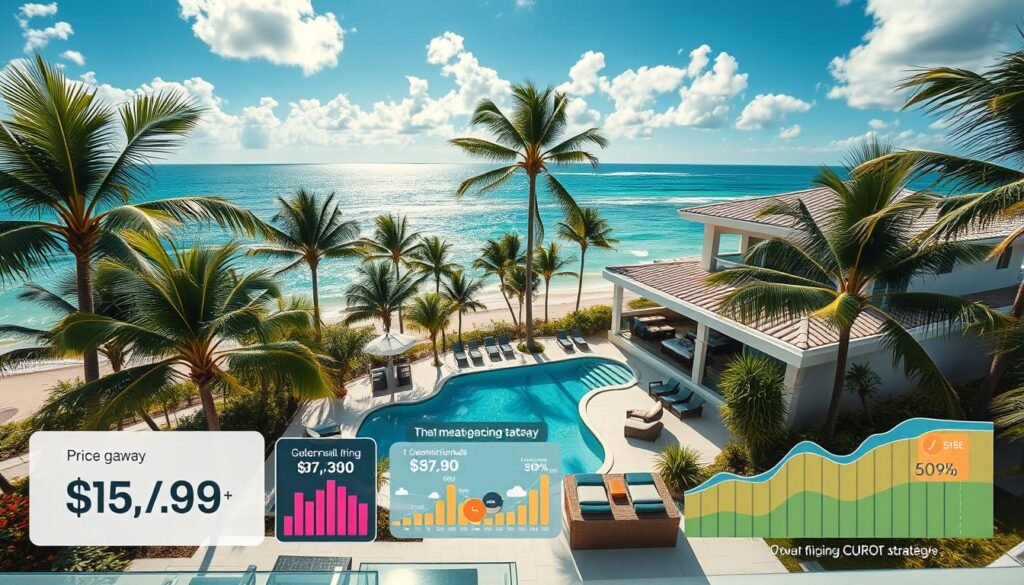
Challenges Facing Short-Term Rentals
While the vacation rental market in Miami continues to thrive, short-term rental providers face several distinct challenges. Chief among these is the competition from traditional hotels, which have long dominated the hospitality landscape. Hotels often offer the familiarity and amenities that some travelers seek, making it crucial for vacation rental hosts to differentiate their offerings and highlight the unique benefits of their properties.
Another significant hurdle is the fluctuating demand for short-term rentals, which can be heavily influenced by seasonal tourism trends, local events, and economic conditions. Vacation rental owners must be adept at anticipating and responding to these market fluctuations to maintain occupancy and maximize vacation rental demand.
Maintenance and Management Issues
Effective vacation rental property management is also a constant challenge for short-term rental hosts. From ensuring the cleanliness and upkeep of properties to managing guest check-ins, maintenance, and turnovers, the logistical demands can be significant. Hosts who fail to address these issues risk negative reviews and a tarnished reputation, undermining their ability to attract and retain guests.

“Staying on top of maintenance and guest management is crucial for short-term rental hosts in Miami. Neglecting these responsibilities can quickly lead to customer dissatisfaction and a decline in bookings.”
To overcome these challenges, successful vacation rental providers in Miami must develop innovative strategies, leverage technology, and prioritize exceptional customer service. By addressing the unique demands of the short-term rental market, they can position their properties for long-term success and growth.
Future Outlook for the Market
As the Short-Term Rental Market Trends in Miami continue to evolve, industry experts predict a promising future for the sector. According to recent studies, the Miami market is poised for sustained growth in the coming years, driven by a surge in domestic travel and the increased demand for unique vacation experiences.
Predictions for Growth
Industry analysts forecast that the Short-Term Rental Market Trends in Miami will experience a robust compound annual growth rate (CAGR) of over 12% through 2025. This growth can be attributed to the city’s thriving tourism industry, the rise of remote work, and the appeal of Miami’s vibrant culture and diverse neighborhoods.
Emerging Trends to Watch
Several emerging trends are expected to shape the future of the Short-Term Rental Market Trends in Miami. These include the increasing popularity of social media marketing for vacation rentals, the growing demand for eco-friendly and sustainable property options, and the integration of smart home technologies to enhance the guest experience.
Potential Regulatory Changes
As the vacation rental regulations continue to evolve in Miami, industry stakeholders are closely monitoring potential changes that could impact the Short-Term Rental Market Trends in Miami. While the city has taken steps to address concerns, such as licensing requirements and zoning restrictions, the future landscape may see further adjustments to strike a balance between the needs of local communities and the growth of the short-term rental industry.
| Metric | Projection |
|---|---|
| CAGR (2021-2025) | 12.4% |
| Estimated Market Size (2025) | $1.8 billion |
| Top Emerging Trends |
|
The future of the Short-Term Rental Market Trends in Miami looks promising, with opportunities for growth and innovation. As the market continues to evolve, industry leaders and policymakers must work together to navigate the vacation rental regulations and ensure the long-term sustainability of this dynamic sector.
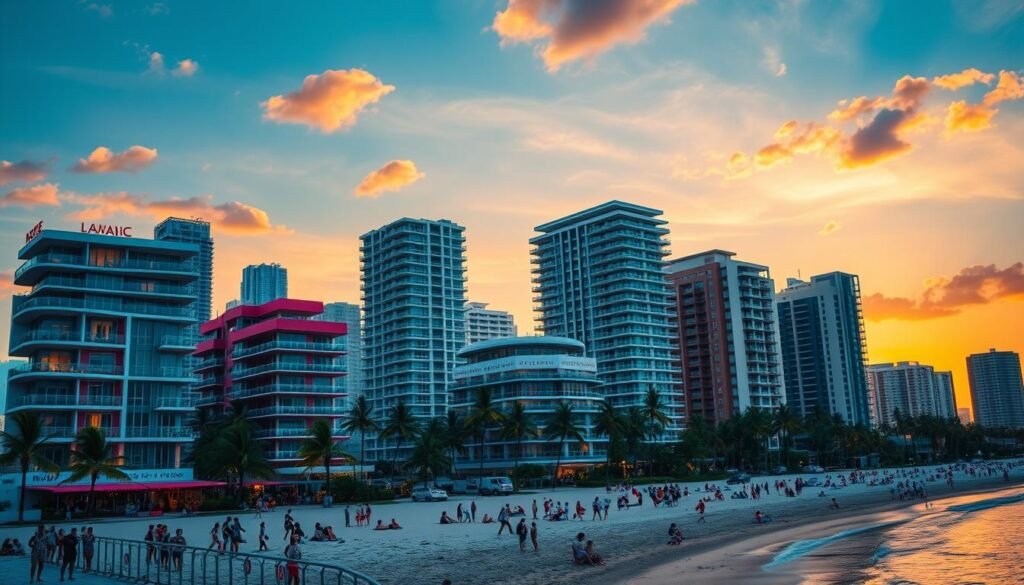
Case Studies of Successful Rentals
As the short-term rental market in Miami continues to thrive, some Airbnb listings and vacation rental hosts have found innovative ways to stand out and attract a loyal customer base. These case studies showcase the strategies and unique offerings that have contributed to their success.
Innovative Hosts in Miami
One such example is Maya, a savvy Airbnb host who has carved out a niche in the Wynwood neighborhood. By offering a stylishly decorated loft with a private rooftop terrace, Maya has capitalized on the growing demand for unique experiences among Millennial and Gen Z travelers. Her attention to detail and personalized hospitality have earned her consistently positive reviews and a high occupancy rate.
Impactful Marketing Approaches
In Brickell, Pedro, a vacation rental owner, has found success through strategic marketing efforts. By leveraging social media platforms like Instagram, he showcases the stunning views and modern amenities of his property, attracting a steady stream of business travelers and urban explorers. Pedro’s use of data analytics has also helped him optimize his pricing strategies and target the right audience.
Unique Property Offerings
- In South Beach, the Oceanfront Luxury Villa has become a sought-after destination for families and groups. Featuring a private pool, outdoor kitchen, and direct beach access, this property offers a level of exclusivity and personalized service that sets it apart from traditional hotel experiences.
- Over in Coconut Grove, the Treehouse Retreat has gained popularity among eco-conscious travelers. This unique rental, nestled among lush greenery, boasts sustainable design features and proximity to the neighborhood’s vibrant arts and dining scene.
These case studies demonstrate the impact that innovative hosts, effective marketing, and unique property offerings can have on the success of Airbnb listings and vacation rentals in Miami’s dynamic short-term rental market.

Role of Property Management Companies
As the short-term rental industry in Miami continues to thrive, the role of professional property management companies has become increasingly crucial. These companies offer a range of services that can greatly benefit vacation rental property owners, from streamlining the day-to-day operations to maximizing the potential of their vacation rental property investment.
Benefits of Professional Management
Property management companies in Miami provide a comprehensive suite of services that can alleviate the burden of managing a vacation rental property. These benefits include:
- Efficient booking and reservation management
- Coordinating cleaning, maintenance, and repairs
- Handling guest communication and providing exceptional customer service
- Optimizing pricing and revenue management strategies
- Ensuring compliance with local regulations and licensing requirements
Cost Comparisons
The cost of employing a property management company in Miami can vary depending on the level of service and the size of the rental property. Typically, management fees range from 20% to 40% of the rental revenue. While this may seem high, the benefits of professional management can often outweigh the costs, particularly for owners with multiple properties or those who live outside of the Miami area.
Selecting the Right Management Partner
When choosing a property management company in Miami, it’s essential to carefully evaluate their track record, expertise, and specific services offered. Factors to consider include the company’s experience in the local market, their marketing strategies, and their ability to maintain high occupancy rates and guest satisfaction. Conducting thorough research and comparing multiple providers can help vacation rental property owners find the best match for their needs.

By partnering with a reputable property management company, vacation rental property owners in Miami can focus on their investment objectives while benefiting from the expertise and resources of professional managers. This strategic approach can help maximize the potential of their short-term rental properties and stay ahead of the competition in the dynamic Miami market.
Community Impact and Neighborhood Dynamics
As the short-term rental market in Miami continues to grow, it is essential to examine its impact on the local communities and neighborhood dynamics. The rise of vacation rentals has brought both economic benefits and concerns for residents, requiring a delicate balance between the needs of tourists and the local population.
Economic Contributions
Short-term rentals have become a significant contributor to Miami’s economy, generating revenue for homeowners and creating jobs in the hospitality industry. The influx of visitors has supported local businesses, from restaurants and shops to transportation services. However, this economic boost has also led to concerns about gentrification and the affordability of housing for long-time residents.
Gentrification Concerns
The presence of short-term rentals in certain neighborhoods has been linked to rising property values and the displacement of lower-income residents. As landlords convert their properties into vacation rentals, the availability of affordable housing for locals decreases, leading to concerns about the preservation of the community’s character and diversity.
Balancing Locals' Needs with Tourism
- Miami’s regulatory efforts aim to strike a balance between the benefits of short-term rentals and the needs of local communities.
- Policies such as licensing requirements, occupancy limits, and zoning restrictions aim to mitigate the adverse effects of vacation rentals on neighborhoods.
- Collaborative efforts between vacation rental platforms, local businesses, and community groups can foster a more sustainable and inclusive tourism ecosystem.
As the short-term rental market in Miami continues to evolve, it is crucial to consider the impact on the city’s neighborhoods and to develop strategies that support both the economic opportunities and the preservation of local communities. By balancing the interests of tourists, homeowners, and residents, Miami can strive to create a vibrant and livable city for all.
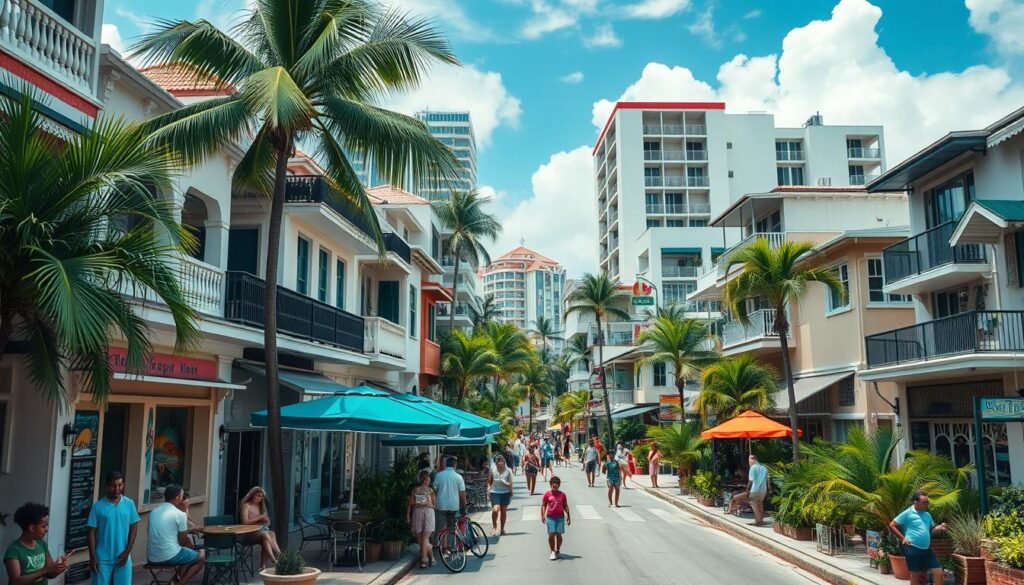
| Metric | Impact |
|---|---|
| Economic Contributions | Increased revenue for homeowners and local businesses, job creation in the hospitality industry. |
| Gentrification Concerns | Rising property values, decreased availability of affordable housing for long-time residents. |
| Regulatory Efforts | Licensing requirements, occupancy limits, and zoning restrictions to mitigate adverse effects. |
“The challenge is to find a way to harness the economic benefits of short-term rentals while preserving the character and affordability of Miami’s neighborhoods.”
Conclusion and Recommendations
As we conclude our exploration of the short-term rental market trends in Miami, it’s clear that this dynamic industry continues to evolve, presenting both opportunities and challenges for hosts, investors, and the local community. The growth of domestic travel, the rise of remote work, and the demand for unique experiences have all contributed to the surge in popularity of rental properties in the region.
Key Takeaways
Miami’s short-term rental market has experienced significant expansion, driven by factors such as the increasing preference for personalized travel experiences and the flexibility offered by remote work arrangements. Regulatory changes have also had a significant impact, with hosts needing to navigate licensing requirements and the balance between accommodating visitors and addressing local concerns.
Strategic Recommendations for Hosts
For those considering rental property investment in Miami, it’s crucial to stay informed about the latest market trends, regulatory updates, and best practices for hosting. Leveraging technology, maintaining high standards of cleanliness and safety, and adopting sustainable practices can help hosts stand out in a competitive market and appeal to the evolving preferences of today’s travelers.
Preparing for Future Changes in the Market
As the short-term rental industry continues to evolve, it’s essential for hosts, investors, and industry stakeholders to remain agile and adaptable. Monitoring emerging trends, anticipating regulatory shifts, and proactively addressing community concerns will be key to navigating the future of Miami’s Short-Term Rental Market Trends and ensuring the long-term sustainability of this dynamic sector.
FAQ
What are the key trends driving Miami’s short-term rental market?
The key trends shaping Miami’s short-term rental market include the increase in domestic travel, rise in remote work opportunities, and growing demand for unique experiences.
How have regulatory changes impacted the short-term rental industry in Miami?
Miami has implemented various regulations, including licensure requirements, that have affected short-term rental hosts and investors. These changes have had a significant impact on the overall market.
Which neighborhoods in Miami are the most popular for short-term rentals?
The top neighborhoods for short-term rentals in Miami are South Beach, Wynwood, and Brickell, each with its own unique characteristics and demand drivers.
How do pricing trends in Miami’s short-term rental market compare to traditional hotels?
Miami’s short-term rental market has seen fluctuations in average daily rates, with seasonal variations, and often competes with traditional hotel pricing in the area.
What role does technology play in Miami’s short-term rental industry?
Technology is crucial in Miami’s short-term rental market, with booking platforms, smart home innovations, and data analytics driving property management strategies and guest experiences.
How do local events and tourism influence the short-term rental market in Miami?
Miami’s vibrant events, festivals, sports events, and seasonal tourism patterns have a significant impact on the demand and pricing dynamics within the short-term rental market.
What sustainability practices are being adopted in Miami’s short-term rental industry?
There is a growing emphasis on sustainability in Miami’s short-term rental market, with eco-friendly property practices, guest preferences for sustainable options, and local government initiatives driving these efforts.
What are the main challenges facing short-term rentals in Miami?
The key challenges include competition from traditional hotels, fluctuating demand, and property management complexities, all of which impact the short-term rental market in Miami.
How are property management companies shaping the short-term rental industry in Miami?
Property management companies play a crucial role in Miami’s short-term rental market, offering benefits like professional management, cost optimization, and expertise in selecting the right partner.
What is the impact of short-term rentals on Miami’s communities and neighborhoods?
Short-term rentals have both economic contributions and gentrification concerns in Miami, requiring a balance between serving the needs of local residents and the demands of the tourism industry.

![Short-Term Rental Market Trends in [Your City]](https://sociosbnb.com/wp-content/uploads/2024/11/Short-Term-Rental-Market-Trends-in-Your-City-1024x585.jpg)

